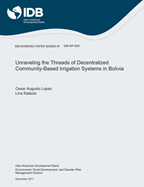Unraveling the Threads of Decentralized Community-Based Irrigation Systems in Bolivia
Date
Dec 2017
Irrigation is a key determinant of agricultural productivity, income, and sustainable development. This paper estimates the impact of the National Irrigation Program with a Watershed Approach (PRONAREC) on the value of agricultural production, investments in complementary technologies, household income, and water resource management in rural communities in Bolivia. We use a unique cross-sectional data set collected from a sample of 1,682 farmers (583 beneficiaries and 1,099 controls) for the 2014-2015 agricultural cycle. To evaluate the effects of the program, we exploit special features of the program design by comparing two rounds of program participants: treated communities are those that received the program first, while control communities are those that were in the pipeline to receive the treatment at a later period. The strategy controls for program placement and self-selection bias at the community level, and we control for self-selection based on observable characteristics with the implementation of Propensity Score Matching. The results show that participation in the program improved the value of agricultural production, and it triggered a deeper process of technological change that led to investments in complementary inputs. Additionally, there is evidence PRONAREC has strengthened farmers’ access to markets, increased household incomes, promoted the formalization of water users’ associations, and improved the organization and management of irrigation systems. Nevertheless, the lack of effects on agricultural productivity suggests program beneficiaries are in the upward sloping curve of the learning process




